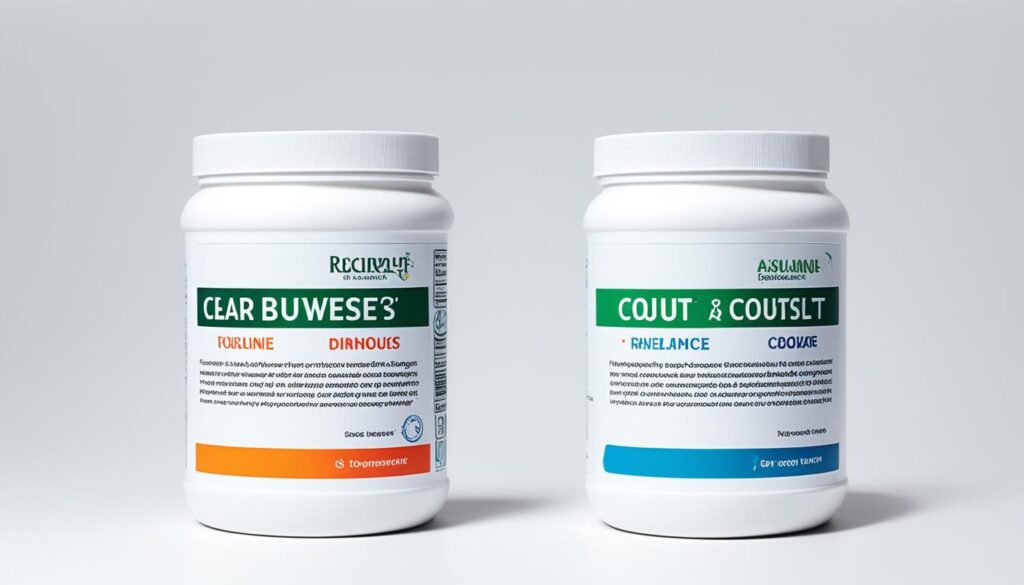Did you know that the HCG diet promises fast weight loss of 1–2 pounds per day without hunger? It sounds like a dream come true for those struggling with their weight. But here’s the catch – the FDA deems it illegal and dangerous. So, before you jump on the HCG bandwagon, let’s explore the facts and learn how to navigate this controversial diet safely.
Key Takeaways:
- While the HCG diet promises rapid weight loss, it is considered illegal and dangerous by the FDA.
- HCG, or human chorionic gonadotropin, is a hormone produced during early pregnancy and is used as a marker in home pregnancy tests.
- The main function of HCG in the body is to support the production of pregnancy hormones and promote the healthy growth of the uterus and fetus.
- The weight loss on the HCG diet is primarily due to calorie restriction, not the HCG hormone itself.
- Low-calorie diets, such as the HCG diet, can lead to muscle loss and a slowdown in metabolism.
What is hCG?
Let’s explore the fascinating world of hCG!
hCG, or human chorionic gonadotropin, is a hormone produced in early pregnancy. It plays a key role in supporting the development of the embryo and fetus. hCG is produced by the cells that eventually form the placenta and is responsible for maintaining the production of important pregnancy hormones.
Aside from its crucial role in pregnancy, hCG has also been used in medicine for other purposes. It is commonly used as a marker in home pregnancy tests to confirm pregnancy. Additionally, hCG has been used to treat fertility issues in both men and women.
Interestingly, hCG was first proposed as a weight loss tool in 1954 by a British doctor named Albert T.W. Simeons. He suggested that hCG injections, combined with an ultra-low-calorie diet, could help individuals achieve rapid weight loss while preserving lean muscle mass. This concept eventually gave birth to what is now known as the hCG diet.
If you’re still wondering, “What is hCG diet all about?” don’t worry, we’ll dive into the specifics of this diet in the upcoming sections.
But before we move on, take a moment to visualize the structure of hCG by referring to the insightful image below:
hCG’s Function in the Body

The hCG hormone plays a crucial role in the body, particularly during pregnancy. It is responsible for maintaining the production of important pregnancy hormones, ensuring the healthy growth of the uterus and fetus. This hormone is produced by the placenta in early pregnancy and acts as a support system for the development of the embryo.
During the first trimester of pregnancy, hCG levels rise rapidly, reaching their peak at around 10 weeks. After this point, the levels gradually decrease, leveling off by the second trimester. While hCG is primarily associated with pregnancy, it also plays a role in other bodily functions.
One of the functions of hCG in the body is to stimulate the production of progesterone, a hormone essential for maintaining a healthy pregnancy. Progesterone helps prepare the uterus for implantation, supports the growth of the placenta, and prevents the shedding of the uterine lining.
Additionally, hCG supports the production of other hormones, such as estrogen and testosterone, which play important roles in the body. These hormones contribute to various physiological processes, including the regulation of menstrual cycles, maintenance of bone density, and development of secondary sexual characteristics.
Effects on the Body
The presence of hCG in the body is indicative of pregnancy. Home pregnancy tests detect hCG levels in urine to confirm pregnancy, as the hormone is not typically present in non-pregnant individuals.
“During pregnancy, hCG levels rise rapidly and play a crucial role in supporting the development and maintenance of a healthy pregnancy.”
It is important to note that hCG’s function in the body is specific to pregnancy and should not be confused with its role in weight loss, as popularized by the hCG diet. While the diet claims to utilize hCG to promote weight loss, there is limited scientific evidence supporting its effectiveness in this context.
hCG and Weight Loss
Proponents of the hCG diet claim that it boosts metabolism and helps with weight loss. However, studies have shown that weight loss on the hCG diet is due to calorie restriction, not the hCG hormone. The hormone does not significantly reduce hunger.
While some individuals may experience weight loss on the hCG diet, the mechanism behind it is not attributed to the hCG hormone itself. Instead, the restricted calorie intake is responsible for the observed weight loss.
Calorie restriction is a well-known method for weight loss. By consuming fewer calories than the body needs, it creates a calorie deficit and forces the body to utilize stored fat for energy. This ultimately leads to weight loss.
“The hCG diet’s effectiveness in weight loss is primarily due to calorie restriction rather than the hCG hormone.”
Research has shown that the hCG hormone does not have a significant impact on hunger reduction. This suggests that any hunger suppression experienced by individuals on the hCG diet is likely a result of the low-calorie intake rather than the hormone itself.
It is important to note that while the hCG diet may result in short-term weight loss, there are potential risks and considerations to keep in mind. Severe calorie restriction can lead to nutrient deficiencies and adverse effects on overall health. Therefore, it is recommended to approach weight loss in a more balanced and sustainable manner.
Comparison of Weight Loss Mechanisms
| Weight Loss Method | Mechanism |
|---|---|
| hCG Diet | Calorie Restriction |
| Traditional Weight Loss | Calorie Restriction + Exercise |
| Bariatric Surgery | Restriction of Stomach Capacity |
As shown in the table above, the mechanism of weight loss in the hCG diet is solely based on calorie restriction. Other weight loss methods, such as traditional weight loss approaches and bariatric surgery, involve a combination of calorie restriction, exercise, and other factors.
It is crucial to understand the underlying mechanisms of any weight loss method before committing to it. Consulting with a healthcare professional or registered dietitian can provide personalized guidance and support for achieving sustainable and healthy weight loss goals.
hCG’s Effect on Body Composition

The hCG diet claims to prevent muscle loss while severely restricting calories. However, there is no scientific evidence to support this claim. Low-calorie diets can lead to decreased muscle mass and a slowdown in metabolism.
The hCG diet, which involves an ultra-low-calorie intake of 500 calories per day, has gained popularity for its promise of rapid weight loss. However, the effects of this diet on body composition are questionable. While proponents claim that hCG injections can preserve muscle mass while reducing fat, studies have shown that low-calorie diets like the hCG diet actually contribute to muscle loss.
During periods of calorie restriction, the body utilizes stored glycogen, fat, and protein for energy. As the body enters a state of energy deficit, it turns to muscle tissue as a fuel source, resulting in muscle breakdown.
Metabolic slowdown is another concern associated with the hCG diet. When the body is deprived of sufficient calories, it responds by slowing down its metabolic rate. This adaptive response is meant to conserve energy and ensure survival during times of famine. However, a slower metabolism can make it more difficult to maintain weight loss in the long term.
While the hCG diet may lead to initial weight loss, it is important to consider the potential consequences on body composition and metabolism. It is always advisable to consult with a healthcare professional before starting any restrictive diet plan.
| Claim | Evidence |
|---|---|
| The hCG diet prevents muscle loss. | No scientific evidence to support this claim. |
| Low-calorie diets lead to decreased muscle mass. | Studies have shown muscle loss during calorie restriction. |
| The hCG diet boosts metabolism. | No scientific evidence to support this claim. |
| Calorie restriction slows down metabolism. | The body adapts to conserve energy during periods of famine. |
The Rules of the hCG Diet
In order to successfully follow the hCG diet, it is important to understand and adhere to the rules and guidelines of each phase. The hCG diet is divided into three phases: the loading phase, the weight loss phase, and the maintenance phase.
Phase 1: Loading Phase
The loading phase is the initial phase of the hCG diet and lasts for two days. During this phase, you are encouraged to eat high-fat foods to build up your fat stores. This allows the hCG hormone to work effectively during the subsequent weight loss phase.
Phase 2: Weight Loss Phase
The weight loss phase is the most crucial phase of the hCG diet and typically lasts for three to six weeks, depending on your weight loss goals. During this phase, you will consume only 500 calories per day, focusing on lean protein, vegetables, fruits, and a small amount of bread. It is important to strictly adhere to the recommended food choices and portion sizes to achieve optimal results.
Phase 3: Maintenance Phase
The maintenance phase is the final phase of the hCG diet and lasts for three weeks. During this phase, you will gradually increase your calorie intake while introducing more food variety. This phase is essential for stabilizing your weight loss and developing healthy eating habits for long-term success.
It is crucial to consult with a healthcare professional or a licensed hCG provider before starting the hCG diet to ensure its suitability for your specific health needs and goals.
The hCG diet provides a structured meal plan that is designed to promote weight loss while maintaining muscle mass. Following the rules and guidelines of each phase is essential for achieving the desired results and minimizing any potential risks. It is important to remember that the hCG diet is not suitable for everyone and should be approached with caution. Always prioritize your health and consult with a healthcare professional for personalized advice and guidance.
Scam Products on the Market

When searching for hCG products online, it’s important to be aware of the presence of scam products claiming to offer homeopathic hCG. These products are labeled as homeopathic, but they do not actually contain real hCG hormone. It is essential to understand that only hCG injections administered under medical supervision can raise blood levels of hCG.
Some online sellers may market these homeopathic hCG products as a convenient and easy way to incorporate hCG into your weight loss journey. However, it is crucial to note that the effectiveness of these products is questionable, as they lack the essential hCG hormone that is the key component of the hCG diet.
Choosing scam products can not only lead to disappointment in terms of weight loss results but also pose potential health risks. It’s important to obtain hCG products and injections from reputable sources, ensuring their authenticity and safety.
Now, let’s take a look at the comparison table below to understand the differences between legitimate hCG products and scam products:
As seen in the comparison table, legitimate hCG products obtained through medical channels provide the necessary hCG hormone for the hCG diet. These products ensure the efficacy and safety of the hCG diet regimen.
“Choosing scam products can not only lead to disappointment in terms of weight loss results but also pose potential health risks.”
To avoid falling victim to scam products and make informed decisions, it is advisable to consult with healthcare professionals or licensed providers who can guide you in obtaining genuine hCG products for your weight loss journey.
Safety and Side Effects

When considering the hCG diet, it’s important to be aware of the safety concerns and potential side effects associated with this controversial weight loss method. The Food and Drug Administration (FDA) has raised questions about the safety of hCG products and has reported several side effects related to their use.
According to the FDA, side effects of the hCG diet can include headaches, depression, and fatigue. These side effects can be attributed to the severe calorie restriction that is a key component of the diet. By severely restricting calorie intake to only 500 calories per day, the body may not receive enough nutrients to function properly, leading to these adverse effects.
“The severe calorie restriction in the hCG diet can result in side effects such as headaches, depression, and fatigue.”
In addition to the potential side effects, the unknown ingredients found in some hCG products can pose health risks. Many hCG products available on the market are labeled as homeopathic and do not actually contain real hCG hormone. These products may contain undisclosed ingredients or potentially harmful substances, further increasing the risk of adverse effects.
To fully understand the potential risks and benefits of the hCG diet, it is crucial to consult with a healthcare professional before embarking on this weight loss journey. They can provide individualized guidance, assess your specific health needs, and help you make an informed decision about the safest and most effective approach for achieving your weight loss goals.
Comparison of reported side effects of the hCG diet
| Side Effects | Severity |
|---|---|
| Headaches | Mild to moderate |
| Depression | Mild to severe |
| Fatigue | Mild to moderate |
As shown in the table above, reported side effects of the hCG diet can vary in severity. It is essential to carefully consider the potential risks and weigh them against the anticipated benefits before deciding to pursue this weight loss approach.
Remember, your health and well-being should always be a top priority. There are safer and more sustainable methods for weight loss that do not involve severe calorie restriction and potentially unknown ingredients. By working with a healthcare professional, you can develop a personalized weight loss plan that aligns with your goals and ensures your safety along the way.
Conclusion
While the hCG diet may promise fast weight loss, it is important to note that it is not approved by the FDA and carries potential risks and side effects. Severe calorie restriction and the use of unknown ingredients in hCG products can pose serious health risks. Therefore, it is advisable to consider safer and more sustainable methods for weight loss.
If you are considering the hCG diet or any other weight loss program, it is crucial to consult with a healthcare professional who can provide personalized recommendations based on your specific needs and health status. They can help you navigate through the potential risks and benefits, and guide you towards the best practices for achieving your weight loss goals.
Remember, prioritizing your safety and well-being is paramount. Making lifestyle changes, engaging in regular physical activity, and adopting a balanced and nutritious diet are proven strategies for sustainable weight loss. Always remember to prioritize your health and consult with professionals before embarking on any weight loss journey.
FAQ
How do I start the HCG diet safely?
Starting the HCG diet safely requires consulting with a healthcare professional who can provide personalized recommendations. They will guide you through the diet plan and ensure your safety throughout the process.
What is hCG?
hCG, or human chorionic gonadotropin, is a hormone produced in early pregnancy. It is used as a marker in home pregnancy tests and has been proposed as a weight loss tool in the HCG diet.
What is the function of hCG in the body?
hCG is a hormone produced during pregnancy that helps maintain the production of important pregnancy hormones. It supports the healthy growth of the uterus and fetus.
Does hCG really help with weight loss?
Studies have shown that weight loss on the HCG diet is due to calorie restriction, not the hCG hormone. The hormone does not significantly reduce hunger or boost metabolism.
Does the HCG diet prevent muscle loss?
There is no scientific evidence to support the claim that the HCG diet prevents muscle loss. In fact, low-calorie diets can lead to decreased muscle mass and a slowdown in metabolism.
What are the rules of the HCG diet?
The HCG diet is divided into three phases: loading phase, weight loss phase, and maintenance phase. The weight loss phase involves consuming only 500 calories per day and following a specific meal plan consisting of lean protein, vegetables, fruits, and bread.
Are there scam products on the market?
Yes, many HCG products available online are labeled as homeopathic and do not contain real HCG. Only HCG injections administered under medical supervision can raise blood levels of HCG.
Is the HCG diet safe?
The HCG diet is not approved by the FDA and has potential risks and side effects. Severe calorie restriction and unknown ingredients in HCG products can pose health risks. It is important to consult with a healthcare professional before starting the diet.
What are the precautions for the HCG diet?
To start the HCG diet safely, it is essential to consult with a healthcare professional, follow their guidance, and be aware of potential risks and side effects. Personalized recommendations can help ensure your safety throughout the diet.
What are the best practices for the HCG diet?
The best practices for the HCG diet include following a healthcare professional’s guidance, sticking to the recommended meal plan, monitoring your health closely during the diet, and being aware of any changes or concerns that may arise.

